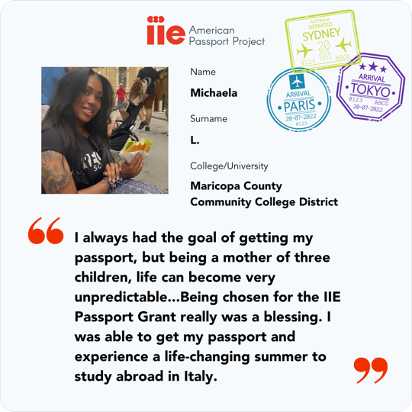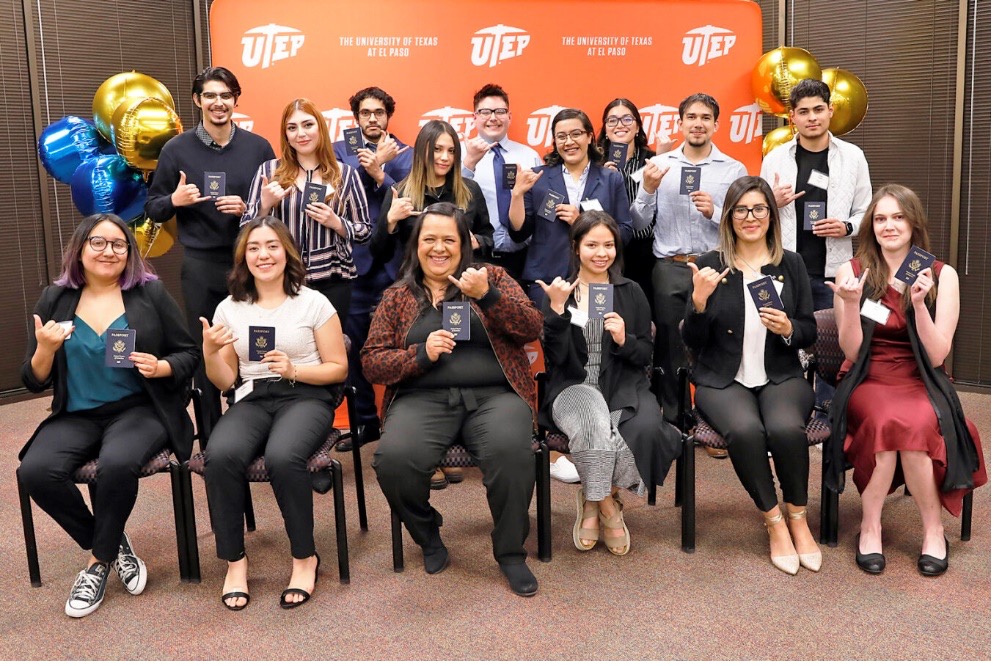above: Alissia Lingaur, an adjunct instructor with Northwestern Michigan College’s Communications Department, leading students through Reserva Natural Atitlan, Guatamala, in 2023.
For those of us dedicated to international education, the importance and power of a passport is a foregone conclusion, and having an annual National Passport Month could seem unnecessary. But what has struck me over the five years I’ve managed the IIE American Passport Project is the number of people who say that they believed a passport and studying abroad “wasn’t for them.” I remember my father’s excitement when he got his first passport in his 60s — to visit me when I was studying in Scotland. I asked him why he didn’t apply for one sooner; he said, “It didn’t seem necessary before.” Statements like his remind me that there are many more people to reach with a simple and powerful message: a passport—and the ability to travel the world—is for everyone.
Programs like the IIE American Passport Project (IIE APP), which awards funding for Pell-eligible students at U.S. colleges and universities are helping break through barriers to open the path to study abroad. So far, we’ve supported 179 institutions across 40 states. I’ve learned many lessons from IIENetwork members and IIE APP recipients along the way.
Tip 1: Meet Students Where They Are
The students who seek study abroad are already motivated, but how do you reach students who don’t even consider it an option? IIE APP institutions have gotten creative, from hosting open workshops on navigating the passport application to co-hosting events with other campus organizations like the TRIO office, identity-based student groups, and student resource teams.
Meeting students where they are, however, goes beyond physical location; you also need to understand and speak to their unique perspectives on studying abroad. Marina Call, International Services and Service-Learning Facilitator at Northwestern Michigan College (NMC), knew that most students would feel overwhelmed if she approached getting a passport as a commitment to studying abroad; NMC is a two-year public community college. “We told them that the passport was our ten-year gift to them. Getting a passport opens up opportunities well beyond their time at NMC. That idea excited them, brought them into our office, and then we were able to start sharing information about study abroad opportunities.” For some students, jumping straight to study abroad is a huge leap, but focusing on obtaining a passport can start them on a transformational journey.
Tip 2: Consider How to Pay by Check in a Digital World
Currently, when you apply for a new U.S. passport, you can only pay by check or money order because it needs to be physically included in the application. But in 2024, many people do not have checkbooks. Also, in most cases they will have to make two separate payments: the passport application fee to the U.S. Department of State and an execution fee to the passport acceptance agency where they are applying. Different IIE APP institutions have devised innovative approaches. Jen Sydow-Madoski at Maricopa County Community College District collaborated with their grants accounting office to cut checks directly from the institution to the U.S. Department of State. “By simplifying the process and cutting checks directly to the U.S. Department of State, we created a more efficient method for students. This approach reduced confusion and ensured that funds were used directly for their passport, making it a win-win for everyone involved.” Public higher education institutions can become Passport Acceptance Facilities through the U.S. Department of State, which I’ve seen not only ease the challenges for students but also have a ripple effect as local community members use the services for their passports.

Tip 3: Passports Are Worth Celebrating
Going through the paperwork and administration of submitting a passport application can make the process feel tedious or procedural. Remember that receiving a passport is something to celebrate! Even a small event or acknowledgment can center the fun and joy of international travel while also providing an opportunity to share more information about the vast array of education abroad options students can pursue.
Judy Moore, Associate Director of Study Abroad at the University of Texas at El Paso, brought all the IIE APP students together at the Global Explorers Reception. “The Associate Dean of Students for International Student and Scholar Global Initiatives presents on the importance of this first step in their study abroad journey. Seated among the students and their guests are also Deans or representatives from the different Colleges at UTEP. By inviting our academic partners, it further grounds the celebration in the realm of scholarship, encouraging students to consider how this might help them participate in international education through study or research in a global environment.” For students from historically marginalized identities, receiving their passport also represents overcoming any barriers and challenges they may have faced in the process.

When I advise these students, I remember the first time I traveled outside the U.S. and how the world felt bigger and full of endless possibilities. I encourage you to consider similar experiences and what it felt like to get your first ten-year gift. This National Passport Month, I am celebrating the 2,600+ students supported by the IIE American Passport Project so far, the thousands of students we will reach in the future, and my international education colleagues who are dedicated to reaching anyone who thinks study abroad is “not for them” with a simple message: “Yes, it is.”
Offered through the IIE Center for International Opportunities, the IIE American Passport Project has issued grants to 176 higher education institutions in 41 states, including community colleges, HBCUs, HSIs, AANAPISIs, and MSIs. Learn more about the American Passport Project here.
